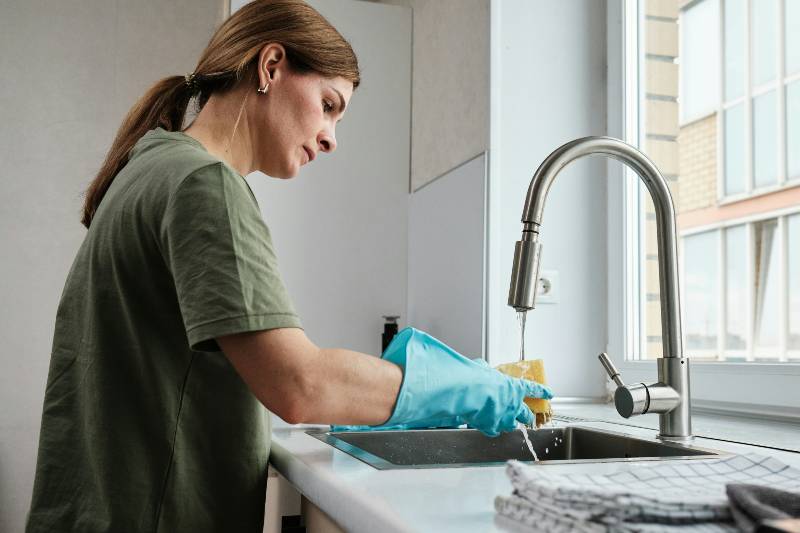As a homeowner, the sound of a gurgling sink can be confusing, especially if the drainage itself seems to be working just fine.
The mysterious noises coming from your plumbing are more than just a minor inconvenience, they are signs that there might be underlying issues that need attention.
Here we’ll talk about the reason of the gurgling sound and provide you with actionable steps to resolve the issue, whether through do-it-yourself methods or with the assistance of professional plumbers.
Why Do Sinks Gurgle But It Drains Fine?
When your sink gurgles, it’s understandable to expect the water to be draining slowly or not at all, but this isn’t always the case. There are several reasons why a sink might gurgle despite the water draining without any apparent problems.
1. A Clog Forms
Clogs don’t always completely block the flow of water. Sometimes, a clog can form around trapped air. As water flows down from the sink and encounters this clog, the trapped air is forced upward, which can cause the gurgling noise you hear.
The water may still drain, albeit less efficiently, but the air struggling to escape is what produces the sound.
2. A Vent Pipe Is Blocked
Your plumbing system is not just about water; air plays a crucial role too. A blocked vent pipe affects the air pressure within your pipes. Every plumbing system has vent pipes that extend to the roof, allowing fresh air to enter the plumbing system.
When these become blocked, perhaps by leaves, debris, or even nests, the water displacement creates a gurgling sound as it struggles to flow past the blockage.
3. A Sewer Line Is Blocked
Below the surface, tree roots can slowly grow into sewer lines which can lead to major blockages. These roots catch waste, like toilet paper and other debris, creating a clog. This issue may not immediately affect the drain speed but will cause air bubbles to rise and create a gurgling sound.
4. A Toilet Trap Is Clogged
Closer to home, a clog in the toilet’s drain line can also affect your sink. If the flow of waste and air is impeded, negative pressure can build up in the drainpipe. This pressure then seeks to balance itself when you run the sink, leading the air to gurgle through the water in the trap.
5. A Vent Stack Is Blocked
Similar to a vent pipe blockage, the vent stack can also become clogged. This large pipe runs through the center of your house and connects to the various vent pipes. If it’s blocked, air gets trapped around the clog. When you drain water, that trapped air then bubbles up, creating the gurgling noise.
6. Partial Blockage in the Drainage Path
A less severe, but still notable cause for gurgling, is a partial blockage in the pipes that lead away from your sink. Grease, food particles, and small objects can create partial blockages. They don’t stop the water flow entirely but do generate turbulence as the water passes, which leads to gurgling sounds.
7. Faulty or Improperly Installed P-Trap
The P-trap, typically located underneath the sink, is designed to hold water and prevent sewer gases from entering the home.
If it’s faulty or improperly installed, it could cause a gurgling sound as it fails to maintain an effective seal, allowing air to bubble up through the standing water.
What You Can Do About A Gurgling Noise In Your Sink?
Hearing your sink gurgle when it should be silently transporting water away can be frustrating. Fortunately, there are several steps you can take to find and fix the cause of this noisy issue.
Step 1: Figure Out The Cause Of The Gurgle
The first step in addressing the gurgling noise is to identify where it’s coming from. Is the gurgling occurring in all the drains or just one? This can help you narrow down whether the problem is localized or systemic.
If it’s just one drain, the issue likely lies in that particular drain’s pipes or P-trap. For gurgling in all drains, the vent stack or sewer line may be at fault.
Step 1: Use a Plunger
Often, a simple plunging can dislodge whatever’s causing the gurgling in a sink drain. Make sure to block the overflow hole of the sink with a damp cloth, then fill the sink with enough water to cover the plunger head and plunge vigorously. This might displace whatever’s causing the air blockage, resolving the gurgling.
Step 3: Inspect the Vent Stack
If you’re comfortable doing so, inspecting the vent stack on your roof can help. Check if it’s blocked by leaves, snow, or a bird’s nest and clear it if needed.
Since this involves climbing onto your roof, it can be dangerous, so only undertake this if you can do so safely.
Step 4: Clean the P-Trap
Clearing out the P-trap is a straightforward task you can usually do yourself. Place a bucket underneath the P-trap to collect any spilling water, then unscrew the connectors and remove it.
Clean the trap thoroughly, ensuring that no debris or buildup remains, and then reconnect it. Make sure it’s tight enough to prevent leaks but not so tight that the connections are damaged.
Step 5: Use a Drain Snake or Auger
For tougher clogs that are further down the pipe, you might need to use a drain snake or auger. This tool can reach deeper into the plumbing to dislodge blockages.
Insert the snake into the drain and turn it while pushing gently until you feel resistance, then continue turning to break apart the clog. Be cautious not to push too hard, as this could damage the pipes.
Step 6: Check for Proper Venting
If you suspect that the vent system is improperly installed or faulty, it may be time to call in a professional. A plumbing vent should extend to the roof and be clear of any obstructions. A plumber can assess and repair any issues with the venting system.
Step 7: Seek Professional Help
When the above steps don’t resolve the gurgling, or if you’re not comfortable tackling these DIY plumbing projects, it’s time to call a plumber.
Persistent gurgling might indicate a more serious problem such as a blockage in the main sewer line or a more complex issue with your home’s ventilation system that isn’t easily diagnosed or fixed without professional tools and expertise.
A licensed plumber can perform a thorough investigation, including camera inspections of the pipes if necessary, to pinpoint the exact cause of the gurgling noise.
Once identified, they can provide a more permanent solution which might involve cleaning out the main sewer line, repairing or replacing sections of pipe, or adjusting the ventilation system to ensure proper airflow.
Routine Maintenance Is Important in Prevent Future Gurgling
To prevent future gurgling and other plumbing issues, regular maintenance is key. Avoid pouring oils, grease, or other clog-forming substances down the drain. Utilize drain screens or strainers to catch food scraps and hair before they enter the drainage system.
Occasionally, you can also run hot water down the drains to help melt away any fatty substances that could be starting to build up on the sides of the pipes.
Consider System Upgrades
Finally, if your home is older or the plumbing system hasn’t been updated in many years, it might be time to consider system upgrades. Modern plumbing fixtures and pipes are designed to minimize issues such as clogs and poor ventilation. Upgrades can not only prevent gurgling
but also improve the overall efficiency and reliability of your home’s plumbing.
When considering system upgrades, it’s important to consult with a professional plumber to understand what changes would be the most beneficial for your home.
This could include installing new fixtures with better drainage capabilities, replacing old pipes with newer materials less prone to clogging, or even rerouting part of your home’s plumbing to improve flow and air pressure balance.
Conclusion
The odd gurgle from a sink might not seem like a pressing issue, but it’s often a sign that something is wrong with your home’s plumbing.
From simple fixes like plunging and cleaning the P-trap to more involved measures like inspecting and clearing vent stacks or calling a professional, you have a range of options to address and resolve the gurgling noises in your sink.





